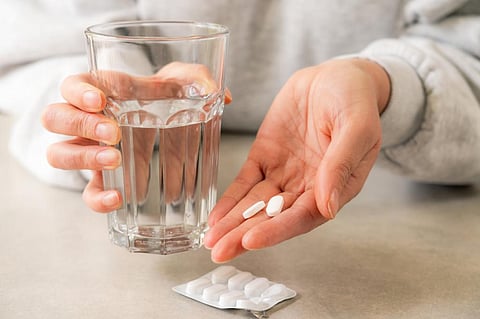

If you had to take paracetamol 650 milligrams instead of paracetamol 500 mg three times a day during the COVID-19 pandemic, you may be familiar with the drug called Dolo-650. The drug is prescribed for reducing fever and pain, but the medicine possibly reached you thanks to its manufacturer’s market strategy.
A petition filed in the Supreme Court by the Federation of Medical and Cell Representatives Association of India (FMRAI) has raised serious questions about the ethics of the market strategies of pharmaceutical companies and medical practices in India. FMRAI is a trade union body for medical representatives.
Several media outlets have reported that freebies worth Rs 1,000 crore were distributed to doctors by the manufacturers of the drug to push it.
Dolo-650 being unethically prescribed to patients during the pandemic is just the latest example of drug companies’ malpractices, senior advocate Sanjay Parikh told Down To Earth. Parikh has taken up the case on behalf of FMRAI.
Doctors also ignored the side effects of an overdose of paracetamol on the liver and kidney, he said.
The petition alleged that medicine textbooks do not support the use of paracetamol 650 mg. The dosage was increased so the drug could be priced higher, it said.
The price of 10 tablets of paracetamol 500 mg was 5 rupees 10 paise in 2013, it said. Pharma companies introduced paracetamol 650 mg, which was priced at Rs 17.50 for a blister pack — three times higher than paracetamol 500.
Doctors prescribed paracetamol 650 mg to patients during the pandemic three times a day, even though there is no evidence that a higher dose is more effective.
Pharmaceutical companies promote drugs a lot, but there is no law to regulate that, the petition said, quoting a study.
There are several laws and regulations enacted between 1945 and 1986 to regulate the manufacture, sale and distribution of drugs. But there is no law regulating drug marketing by medicine firms.
“Drugs and Cosmetics Act, 1940 regulates the manufacture, sale and distribution of drugs. Drugs and Magic Remedies (Objectionable Advertisements) Act, 1954 and Consumer Protection Act,1986 are also in place,” said the petition.
“However, there is no law regulating the marketing and promotion of pharmaceutical companies. Hence the drug companies are becoming autocratic,” it added.
A doctor’s licence can be revoked for malpractice because of their relationship with a pharma firm. However, the law is one-sided as the drug firms that abet malpractice is exempt from the purview of that law.
The Indian Medical Council (Professional Conduct, Etiquette and Ethics) regulation was brought in 2002, the plea further said. Doctors getting gifts, travel facilities, cash or other monetary benefits, etc from pharmaceutical companies was prohibited under it. Sometimes, doctors are subject to litigation under it, but pharma firms get away scot-free.
There are stringent laws in place to reduce corruption in the pharma sector in countries like the United States, France, Germany, Hungary, Italy, UK, etc, the plea said.
One way to stop graft is a common law that prevents and prohibits bribery in the private sector. Another is special laws or provisions to prevent the corruption of pharma companies.
These laws have been effectively implemented in these countries, the petition claimed. Criminal cases have been filed against pharma companies and heavy fines have been imposed on them.
In 1996, a doctor was sentenced to death for a heart valve scandal in Germany. In addition, Johnson & Johnson was fined $2.2 billion in 2009. In addition, in 2013, Pfizer was fined $2.3 billion to settle civil and criminal charges.
There are more examples of Glaxo Smith Kline paying a fine of 3 billion euros in 2014, in which four officials went to jail in China. In 2018, Pfizer had to pay a US$23.85 million fine for bribery in India.
The nexus between pharma firms and doctors continues to increase the sale of medicines. A study found that seven major pharma companies spent a total of Rs 34,186.95 crore on marketing in eight years, which significantly increased the price of the drug, the plea added.
Sales promotions account for about 20 per cent of the cost of the drug as well.
Retail medicines worth Rs 42,000 crore were sold in a year, most of which are unethical and harmful, FMRAI claimed in the petition. Authorities are ignoring these malpractices despite protests, it said.
Approval to over 290 fixed-dose combination drugs was taken back earlier. However, over 100 such combinations again became available in the market with the permission of the Drugs Controller General of India, the head of the department of the Central Drugs Standard Control Organization, the plea alleged.
The nexus runs very deep. As doctors can’t receive any cash or gifts, pharma firms give out inducements and benefits and doctors then play with the health of the common people, the FMRAI alleged.
Under these unethical practices, patients are prescribed high-dose drugs for a long-term treatment. Often, such combinations in the prescription are not essential.
The government had proposed implementing the Uniform Code for Pharmaceuticals Marketing Practices in 2015, which was then called voluntary, after many protests, said Parikh.
The code was to be implemented for six months, after which it was to become a legal provision. “But this has not happened till date and drug companies are not regulating themselves,” he said.
“There is a need for a strict law like the international provisions which not only curbs unethical practices like these but also gives them severe punishment for playing with the health of the people,” Parikh added.
The Supreme Court is now hearing the matter. Earlier, a case of wrong prescription of Dolo-650 had come to the fore, but no action was taken.